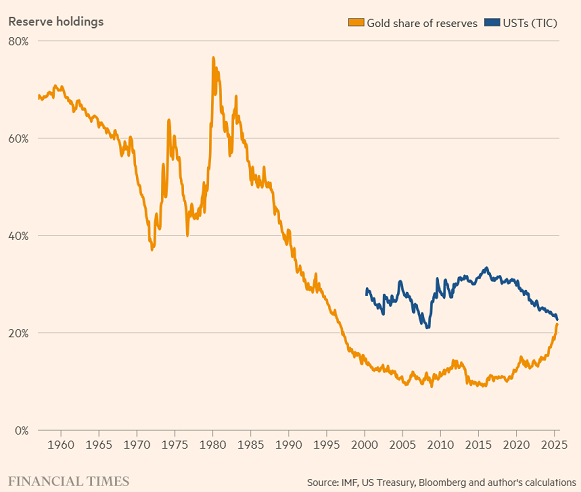Gold Hits 6th Record in 7 Sessions as Central Banks Keep Buying
GOLD PRICES leapt to fresh all-time highs in all currencies on Tuesday, finally topping April's high in Chinese Yuan as the Dollar price of gold recorded its 6th new record day in just 7 trading sessions so far this September while new data showed more central banks continuing to buy bullion for their reserves.
Gold fixed above $3670 per Troy ounce at London's 3pm benchmarking auction, as a revision to US jobs data said the world's largest economy had almost 1 million fewer people in work as of March than previously estimated.
Israel meantime hit the Qatari capital Doha with an airstrike aimed at senior leaders of Palestinian militant group Hamas, swiftly condemned by the State of Qatar.
"Gold is underpinned by a confluence of factors," says today's Points of Return column from Bloomberg's John Authers, pointing to "lingering inflation, monetary policy inertia, and the destabilizing effects of President Donald Trump’s trade nationalism.
"Questions over the Dollar's role as the world's reserve currency have [also] gilded gold's status."
"Fears over the Trump administration's economic policymaking," agrees former fund manager and now FT blogger Toby Nangle, "are now naturally combining with longer-standing concerns about the weaponisation of the US Dollar."
But while a chart widely shared on social media last week is likely correct in showing central-bank gold reserves overtaking that sector's US government bond holdings, "this is mostly about recent price action," says Nangle's analysis, "rather than a fundamental and dramatic shift out of Treasuries and into the yellow metal" across 2025 to date.

After the People's Bank of China said it added 2 tonnes of gold to its bullion reserves in August, new data from the Czech National Bank, the Bulgarian National Bank and the Central Bank of Uzbekistan says that they each added the same quantity to their gold reserves too last month.
2025's top gold buying nation Poland made no additions for the 3rd month running. But after overtaking the European Central Bank's holdings by almost 10 tonnes in May at 515 tonnes, NBP Governor Adam Glapinski said last week that he wants gold to reach 30% of his nation's reserves, up from the current figure of 20%.
The price of London gold bullion in US Dollars − the precious metal's global benchmark − today made its 32nd new daily high of 2025 even as the US currency rose from 11-week lows on the FX market following the Bureau of Labor Statistics' revision to non-farm payrolls data.
The price of gold also hit its 29th fresh record in UK Pounds and the 25th in Euros at £2707 and €3125 respectively.
France's borrowing costs meantime rose briefly above those of Italy − the first time since before their monetary union through the Euro in 1999 − following the collapse of centrist Prime Minister François Bayrou's Government, ousted by a vote of no confidence.
"No fewer than 150 blockades are planned across France" in tomorrow's September 10 protests against Bayrou's proposed "austerity" cuts to government spending, reports Le Figaro, with the Interior Minister warning the number could reach 600.
"Law enforcement is preparing a robust welcome committee" for the "ultra-left groups" now driving the 'Bloquons tout' movement (let's block everything).
Gold in Shanghai today topped 22nd April's record high of ¥830 by ¥1 per gram. But relative to London quotes, wholesale prices in China − gold's No.1 mining and consumer nation − showed a discount of $15 per Troy ounce.
That's around twice the level of the typical premium in Shanghai over London, and shows a marked disincentive for banks to book new imports right now.
In contrast to gold, silver fell back today, dropping 1.5% from Monday's fresh 14-year peak to erase this week's previous gain at $41.06 per Troy ounce.









 Email us
Email us